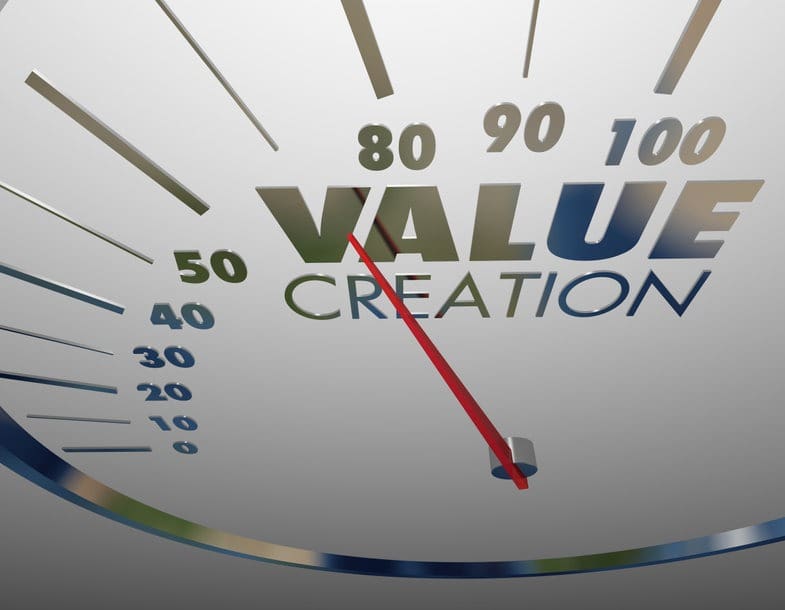Deliver Value Installment #1: Definition of Value (DoV)
Deliver Value Installment #1: Definition of Value (DoV)

Author: Dr. Dave Cornelius
If you ask several people what the definition of value is, you will likely receive varying responses. Let's begin with the dictionary and see what is written about the definition of value in the Merriam-Webster dictionary. This dictionary was established in 1828. Value is identified as a noun, verb, and adjective. The following are the three (3) definitions as a noun that I selected:
- The monetary worth of something, like market price
- A fair return or equivalent in goods, services, or money for something exchanged
- Relative worth, utility, or importance
I spoke to four people who may have an influential opinion in business and the agile community.
Marty Nelson, Alchemy Code Lab founder:
Value has a positive exchange, positive emotion, and experience. Value is generative - money, friends, and social connections, working ecosystems. Value is something that satisfies true wants.
Diana Larsen, author of Agile Retrospective and co-found of Agile Fluency Model:
I think there are different kinds of value. It's too bad we only have one word to talk about several definitions.
One context is value to the customer. Businesses are sensitive to their customers' needs. They want to give the customer what they want so that customers will pay for services and products. So, there's the value around the value stream going to the customer. Are we getting closer and closer as time goes by to build what the customer wants and will accept and pay for? Product management helps the organization focus on the items with the highest priority over others, which gives a sense of, "this is more valuable than that, at least at this moment in time."
To better understand priority, we can add methods like the cost of delay, and it begins to get us closer to understanding value as well.
Then there's also business value, which is the investments enabling the business to thrive, be resilient, and sustain over time. Value, I think in the business sense, is very much tied to strategic direction. Is this strategic position providing us value because it's moving us more toward our strategic goals, like targets in the Improvement Kata? Is this moving us in the direction that we need to go to give greater value to the business? In the Agile Fluency model community, we tend to talk about value as business benefits. The value is the benefits that the business wants to gain from supporting and investing in their teams to help achieve the maximum value from the products in the market.
Dave West, CEO, Scrum.org:
Value is a subjective measure. Therefore, it is not how I define it that matters, but ultimately the person and organization that I wish to bring value to that are relevant.
For example, it would be easy to describe the outcome of a sale (happy customer, rich seller, etc.), but ultimately you have to ask why is the person buying that thing – what is the value they want to receive? Also, what value does the seller achieve – why are they selling this thing rather than doing something else? It is a complex question – so ultimately, I say the value is something defined by the individual that describes the outcome of the event.
Howard Sublett, CEO, Scrum Alliance:
In my mind, value is a relationship between the amount someone pays and what they perceive that they get in exchange or the amount of effort that's expended for the perceived return. It can also be the amount of joy you perceive in return.
For example, if I were to drive across the country to visit the Grand Canyon in Arizona from New York City — perhaps one of the things on some people's bucket lists. If I invest a lot of time, money, and effort to get there and when I arrive, the weather is foggy and rainy. I can't see the views or experience the canyon in the way I'd envisioned. Then I will perceive the experience as a low-value even though it's generally considered a high-value thing to do.
Alternatively, a low-effort, high-value experience for me is sitting on the back patio and having coffee with my bride. We don't get to do it often with me traveling so much lately, but when we do, it requires minimal effort and returns an incredible amount of value to me in my personal development. So, value is the relationship between what you invest or pay and the amount of joy you perceive that you received in return.
Definition of Value (DoV)
Value is the experience of receiving something useful that is beneficial to us. Value is also giving something of merit to others that is good or helpful. The recipients of value are customers, people at work, in our community, and family. We want to receive value when we engage in a transaction with a company or interact with people. Value has a different meaning to each person or group, or company. This is because we have different experiences and expectations based on background and culture. We all desire to receive value.
My definition of value is outcomes that are measurable, realizable, and shareable.
Outcome Values Are Measurable
Outcomes are the payoff or benefits received from a specific interaction or transaction. The measurable outcomes can be quantifiable or qualifiable, demonstrating that the benefits are validated learning and not a hypothesis. Objectives Key Results (OKR) is one method to measure the outcomes. Google, rock star Bono, and The Gates Foundation used the OKR method to identify what was the most important for the next three, six, or twelve months. The OKR structure is broken into two parts that include 1) an objective (why is this important) and 2) key results (benchmark and monitor how to get to the objectives). An OKR example follows:
Objective: COVID-19 infection reaches herd immunity level globally
Key Results 1: 85% of the world's population vaccinated by Q1 2022
Key Results 2: Misinformation reduced to affect only 1% of people in Facebook by Q1 2022
Key Results 3: 65% of the global population are ambassadors for healthy living by Q2 2022
Outcome Values Are Realizable
The second value attribute is realizable, which represents the actualization of a desired or even an unknown outcome. In 1943, Abraham Maslow created the paper "A Theory of Human Motivation." The paper described five levels of human needs.
If we think of five steps in a staircase:
- the first step is physiological (food, water, warmth, and rest)
- the second step is safety (security)
- the third step is belongingness and love (intimate relationships and friends)
- the fourth step is esteem (prestige and feelings of accomplishments
- the fifth step is self-actualization (achieving your full potential, including creativity)
The realization of the measurable outcome is the fifth step in the staircase of actualization. Not driven only by one's capability but fueled by collaboration with other people.
Outcome Values Are Sharable
People are seeking to obtain value in many areas of life. It is the reason that we spend a tremendous amount of time on social media sharing lived experiences or desires. We are often on a quest to find value through our experiences. The concept of value as an experience or outcome to be shared provides a way for others to validate the perception of value.
As a professional coach, I am an aspiring creator of value, and my mantra is "helping people achieve awesomeness." This is a tall order to achieve but a worthy journey in all aspects of life. Helping people achieve their level of awesomeness is a partnership that I engage in with people that I coach.
However, the ultimate ownership resides with the individual(s) working toward a meaning of awesomeness. When we say someone is awesome, we are describing the meaning of value at the highest level. The words that come to mind are awe-inspiring, magnificent, amazing, impressive, and wonderful. These words are synonyms for the word awesome. Please be aware that "awesomeness" is not a real word in the dictionary.
The "pursuit of happiness" was written in the 1776 United States Declaration of Independence. The "pursuit of happiness" is an American dream, but not exclusively. I want to assert that happiness is a state of satisfaction. When people achieve their level of awesomeness, it is one state of satisfaction. As we deliver value, the state of satisfaction is being given and received.
Summary
In an article written in the Harvard Business Review (HBR) by Eric Almquist, John Senior, and Nicholas Bloch, the authors defined four value elements: functional, emotional, life-changing, and social impact. Marty Nelson (positive emotion), Diana Larsen (investments enabling the business to thrive), Dave West (outcome of the event), and Howard Sublett (high-value experience -- coffee with my bride) described the four elements of value defined in the HBR article.
